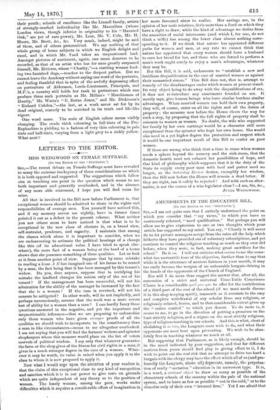LETTERS TO THE EDITOR.
MISS WEDGWOOD ON FEMALE SUFFRAGE.
[TO THE EDITOR OF THE "SPECTATOR.)
Sut,—The recent debate on Female Suffrage must have revealed to many the extreme inadequacy of those considerations on which
it is both opposed and supported. The suggestions which follow aim at touching one point in the question which seems to me both important and generally overlooked, and in the absence of any more able statement, I hope you will find room for mine.
All that is involved in the Bill now before Parliament is, that exceptional women should be admitted to share in the rights and
responsibilities of average men. You yourself have noticed this, and if my memory serves me rightly, have in former times pointed it out as a defect in the present scheme. What neither you nor others seem to have noticed is that what is to be exceptional in the new class of electors is, on a broad view, self-restraint, prudence, and sagacity. I maintain that among the classes which alone it is important to consider, when we are endeavouring to estimate the political bearings of a change like this (of its educational value I have tried to speak else- where), the mere fact of a woman being at the head of a house shows that she possesses something of these qualities. Let us look at it from another point of view. Suppose that by some mistake in reading a lease A 13 has imagined one of his farms to be rented by a man, the fact being that it has been managed by this tenant's widow. Do you, does anyone, suppose that in rectifying his mistake the landlord changes his notion only of the sex of his tenant ? If the management has been successful, will not his admiration for the ability of the manager be increased by the fact that she is a woman ? If the case is reversed, will not his censure be mitigated? In other words, will he not implicitly, and perhaps unconsciously, assume that the work was a more severe test of ability for a woman than a man ? I can hardly fancy these questions answered in the negative, and yet the important and unquestionable inference—that we are proposing to enfranchise only those women who have given stronger proofs of all the qualities we should wish to incorporate in the constituency than a man in like circumstances—seems to me altogether overlooked. I am not saying that you will find the farmers' widows and spinster shopkeepers whom this measure would place on the list of voters marvels of political wisdom. I say only that whatever guarantee the farm or the shop gives of the fitness for civil rights in a man, it gives in a much stronger degree in the case of a woman. What- ever it may be worth, its value is raised when you apply it to the class to whom it is now proposed to apply it.
Now what I would urge upon the attention of your readers is, that the claim of this exceptional class to any kind of recognition and sanction which it is in our power to give rests on grounds which are quite independent of any theory as to the position of women. The lonely woman, among the poor, works under difficulties which it requires a considerable effort of imagination in her more favoured sister to realize. Iler savings are, in the opinion of her male relatives, little more than a fund on which they have a right to draw, while the kind of advantage we derive from the amenities of social intercourse (and which I, for one, do not think a trifle) has among the lower class almost nothing corre- sponding to it. If we think that nature has appointed different paths for women and men, at any rate we cannot think that nature has appointed that every woman should have a husband to earn her bread for her, and those who are forced to perform a man's work ought surely to enjoy a man's advantages, whatever they may be.
But this Bill, it is said, endeavours to "establish a new and invidious disqualification in the case of married women as against their unmarried sisters." This Bill does not, that is, attempt to remedy all the disadvantages under which women at present stand. Its very object being to do away with the disqualifications of sex, it does not re-introduce any enactments founded on sex. It merely says, give human beings who have similar burdens similar advantages. When married women can hold their own property, they will, of course, enter on all the rights and all the duties of property ; the measure now before the House clears the way for such a step, by proposing that the full rights of property shall be common to women as women. No doubt, the wife who supported her family by her own earnings would be a character still more exceptional than the spinster who kept her own house. She would also need in a yet higher degree the protection and respect which it would be one important result of this Bill to confer on poor women.
If those are wrong who think that a time is come when woman needs a sphere beyond the nursery and the sick-room, that the domestic hearth need not exhaust her possibilities of hope, and that kind of philosophy which supposes that it is the duty of the State to supply every poor man with beef and porter need no longer, as the Saturday Review desires, exemplify her wisdom, then the Bill now before the House will remain a dead letter. If they are right, can it safely be rejected ? And with such an alter- native, is not the course of a wise legislator clear ?.—I am, Sir, &c., JULIA W F,DG WOOD.






























 Previous page
Previous page